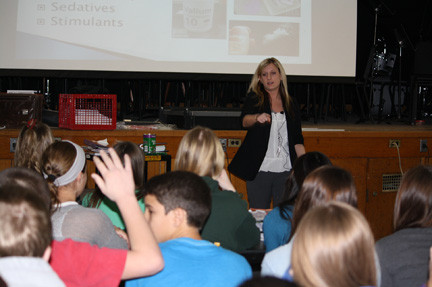Lynbrook students learn about dangers of substance abuse
As part of a continual districtwide effort to combat substance abuse by students, Lynbrook North Middle School eighth-graders attended a presentation about the dangers of alcohol and drug abuse conducted by the Long Island Council on Alcohol and Drug Dependency.
LICADD representative Lisa Ganz spoke frankly with students about the real dangers of mind- and mood-altering drugs, including alcohol, amphetamines, cannabis, hallucinogens, opiates, benzodiazepines, sedatives and stimulants. She also emphasized that misusing legal substances such as alcohol and prescription medications can be just as dangerous as using street drugs.
“There is a big difference between the use of prescription medications such as OxyContin for medicinal purposes and the misuse and abuse of such highly addictive substances,” said Ganz.
Ganz also revealed some startling statistics about the use of gateway drugs such as alcohol, nicotine and marijuana. For example, people who begin drinking alcohol before the age of 15 are four times as likely to become alcohol dependent.
“All of our patients who are addicted to heroin started with alcohol, nicotine, marijuana and prescription medications,” said Ganz. “What’s even more alarming is that the progression from these gateway drugs to heroin occurred within two to three years. We are now seeing 16-, 17- and 18-year-old heroin addicts.”
In addition, according to a recent report published by the CDC, unintentional overdose of opiate pain relievers has now surpassed auto accidents as the leading cause of accidental death in the U.S.
Ganz concluded by challenging students to think about the reasons why people use drugs — to escape from reality, to feel better, for social acceptance, to lose inhibitions, or simply out of curiosity.
“It starts with curiosity, but quickly evolves into dependency,” she explained.
She then led the students on an exploration of the four primary emotions — sadness, happiness, anger and fear. “Three-quarters of these emotions don’t feel good,” she pointed out. “If you use medication every time you experience one of these, it quickly progresses from feeling like it helps you to cope to feeling like you can’t function without it.”






